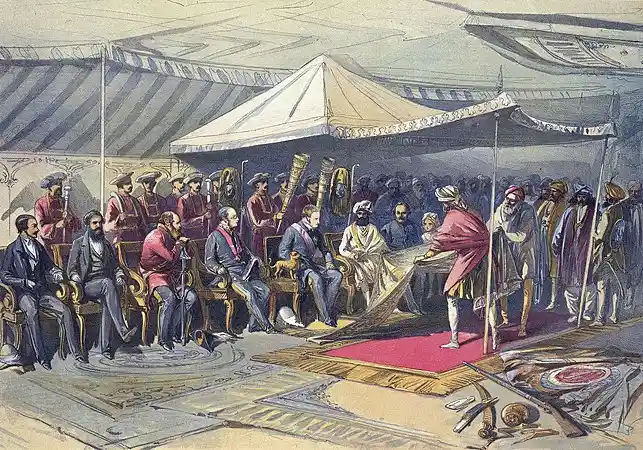From East India Company to British Raj
Napolean’s attack proved fatal for industries in England. The pressure on the British parliament to withdraw the exclusive right to ‘trade’ in India that was given to East India Company was immense. Will the century-old rule of EIC in India come to an end?

Transfer of power from EIC to the British parliament; Image source: Wikipedia
The last we saw was how The Charter Act of 1813 abolished all the exclusive rights that East India Company had to trade with India with exception of the tea trade. This was a huge blow for the company, for now, it had to compete with other companies from England for the Indian market. The growing corruption among the EIC’s officers led the British parliament to rethink the powers these officers were given and the position held in the Indian subcontinent.
As expected the next Charter, which was, The Charter Act of 1833 renewed their contract for yet another 20 years but abolished all the exclusive rights of EIC (earlier tea trade and trade with China wasn’t abolished). The Charter even mentioned that company should start winding up all its commercial business as soon as possible. The company’s administrative work continued and the company still possessed the Indian territories but it was held ‘in trust for his majesty’.
What do you think would have been the effect of opening India for all companies?
This move strengthened the legalization of India as a British colony. All the matters related to law, education, and employment were subjected to Europeanisation. There were move to abolish slavery and work for their progress. Many local laws were abolished and laws similar to those prevalent in Britain were implemented.
In order to achieve all these things, one very important decision was made through this charter and that was, the elevation of ‘Governor-General of Bengal’ to ‘Governor-General of India’. This change was more than just a change in the name. You can see this step as a move towards consolidation and centralization of the Indian administration so, local powers could be ruled under one British regime.
For the first time, Indians were admitted into administrative services. The Charter Act mentioned that all will be entitled to enter public services and prohibited discrimination on the basis of caste, religion, creed, race, place of birth in the matter of public employment.
Executive bodies were separated from the legislative bodies. You can see how the British parliament tried to reorganize India in a structure similar to that of Britain. This is a stark difference from the company’s rule where the officers tried to facilitate the drain of wealth for their own benefit. It was obvious that this charter tried solidifying India as a colony. It was also an indication that the company’s rule would be further curbed.
Then came the bombshell- The Charter Act of 1853. For the first time, the company’s contract was renewed but didn't mention the term ‘20 years’. It also established the parliamentary system of governance in India. It meant the company’s administration could end anytime.
As you know, in the coming 4 years, the Revolt of 1857 happened which provided the British parliament with the perfect opportunity to justify ending the rule of the East India Company.
The corrupt officers of EIC in their rule of somewhat 100 years managed to amass huge wealth for themselves in India leaving the company on the verge of bankruptcy. The East India Company is an example of one of the most petrifying lessons about the abuse of corporate power in history.


